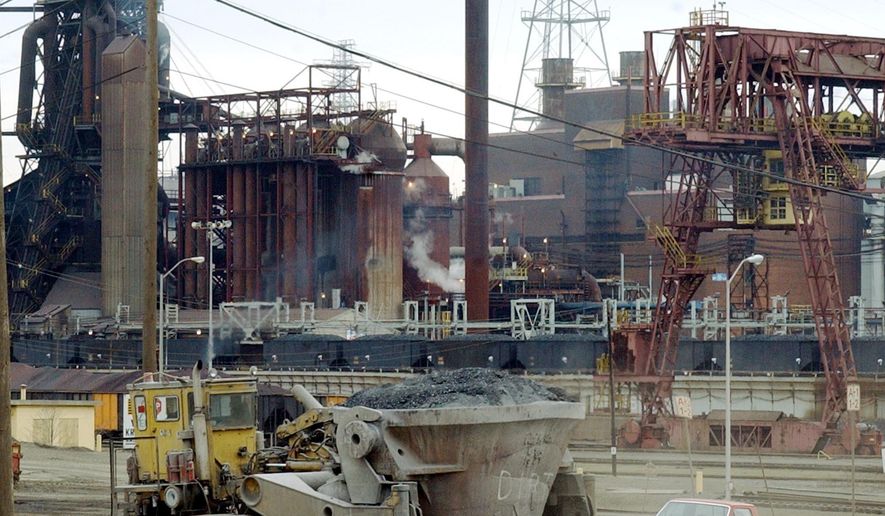HARRISBURG, Pa. (AP) - Pittsburgh-based United States Steel Corp. said Friday that it is canceling a $1.5 billion project to bring a state-of-the-art improvement to its Mon Valley Works operations in western Pennsylvania, saying the world has changed in the two years since it announced its intentions.
Project permits initially stalled by the pandemic never came through, U.S. Steel has added capacity elsewhere, and now it must shift its focus to its goal of eliminating greenhouse gas emissions from its facilities by 2050, it said.
The loss of what would have been one of the largest industrial investments in Pennsylvania quickly led to recriminations by Pittsburgh-area politicians, labor unions and business organizations over why the project could never secure permits. Some worried it will diminish the future of steelmaking there.
“We had a window of opportunity and it’s absurd that we as a region have allowed that window to be slammed shut,” said Jeff Nobers, executive director of Pittsburgh Works, a coalition of labor unions, corporations and local business chambers.
U.S. Steel revealed the news in an earnings call Friday morning and in an “open letter” on social media.
It also said it will shut down batteries 1, 2 and 3 at its Clairton Plant by early 2023 - representing approximately 17% of coke production at the plant - to help reduce polluting emissions from equipment long-criticized as among the area’s worst polluters.
“The world is changing rapidly and we’re on the ten-yard line with 90 yards ahead of us,” David Burritt, the company’s president and CEO, said in the letter.
U.S. Steel said it does not anticipate laying off any of the 130 full-time workers at the three batteries, and that job reductions will come from retirements and reassignments.
Two years ago, the company’s plan had been to improve its steelmaking efficiency and reduce emissions at its Mon Valley Works operations.
Adding new casting and rolling technology at its Edgar Thompson Plant to allow it to combine thin slab casting and hot rolled band production into one process had been touted as the first of its kind in the U.S.
The upgrade was designed to make the plant a primary source of material for high-strength, lightweight and flexible steel that feeds the automotive sector.
U.S. Steel had initially expected the first production in 2022, but in the meantime, the company has added capacity elsewhere to feed demand for lightweight steel.
It also had envisioned a new cogeneration facility at its Clairton Plant with an emissions control system that could convert some of the coke oven gas generated there into electricity to power other parts of the plant.
The Pittsburgh Regional Building Trades Council pinned the blame for the loss of the project on unnamed local elected officials that it accused of a lack of support and open hostility toward the company and its workers.
It will mean the loss of approximately 1,000 full-time union construction jobs and a longer-term threat to 3,000 workers at the Mon Valley Works complex, said Tom Melcher, business manager for the Pittsburgh Regional Building Trades Council.
“It’s absolutely unacceptable that any politician or business or community leader who claims to be supportive of union jobs and a strong middle class can allow this project to be lost,” Melcher said in a statement.
U.S. Steel said it is still committed to steelmaking in western Pennsylvania.
Last spring, as the pandemic prompted shutdowns of large sectors of the economy, U.S. Steel acknowledged it had to delay groundbreaking until conditions improved.
That delay came after the Allegheny County Health Department halted the permitting process because of the challenges the coronavirus posed to the public comment process.
U.S. Steel never secured those permits, and it pointed out that, over the same time period, a competing steelmaker in another state announced a new steel mill and will be ready to make steel this year.
In the meantime, U.S. Steel commissioned the manufacturing of the equipment and began site preparations, but it remained in the beginning stages of the project with over $170 million spent and equipment in storage in Pittsburgh-area warehouses.
The county health department said it was “disappointed” by suggestions that its permitting process helped lead to U.S. Steel’s decision to scrap the plan.
In a statement, its deputy director of environmental health, Jim Kelly, said the agency had worked proactively and closely with US Steel on the project, starting in May 2019.
___
Follow Marc Levy on Twitter at www.twitter.com/timelywriter.




Please read our comment policy before commenting.